Ever thought about why your Bengal cat is sneezing a lot? Even though a single achoo! is cute, sneezing often might be a bigger issue. Bengal cats react to many nasal irritants such as smoke or dust. Are you ready to solve the mystery behind those sneezes?
When your Bengal cat goes feline achoo!, it may mean they’re reacting to things in their space. While some sneezing is okay, a lot of it might signal bigger health issues. Watching when and where your cat sneezes is key to understanding why. This can lead you to the right solution.
Make sure it’s actually sneezing and not something else like coughing. Tracking their health with a pet tracker can shed light on their sneezing and what’s making them do it.
Showing a little care can help them get back to normal breathing and health. But if the sneezing doesn’t stop, we can look into the problem further.
Key Takeaways
- Occasional sneezing in Bengal cats is usually harmless, but frequent sneezing requires attention.
- Common nasal irritants include smoke, dust, and pollen.
- Monitoring sneezing patterns can help identify potential causes.
- Ensure your cat is sneezing and not displaying similar behaviors like coughing or gagging.
- A pet tracker can provide valuable insights into your Bengal cat’s health and exposures.
Common Causes of Bengal Cat Sneezing
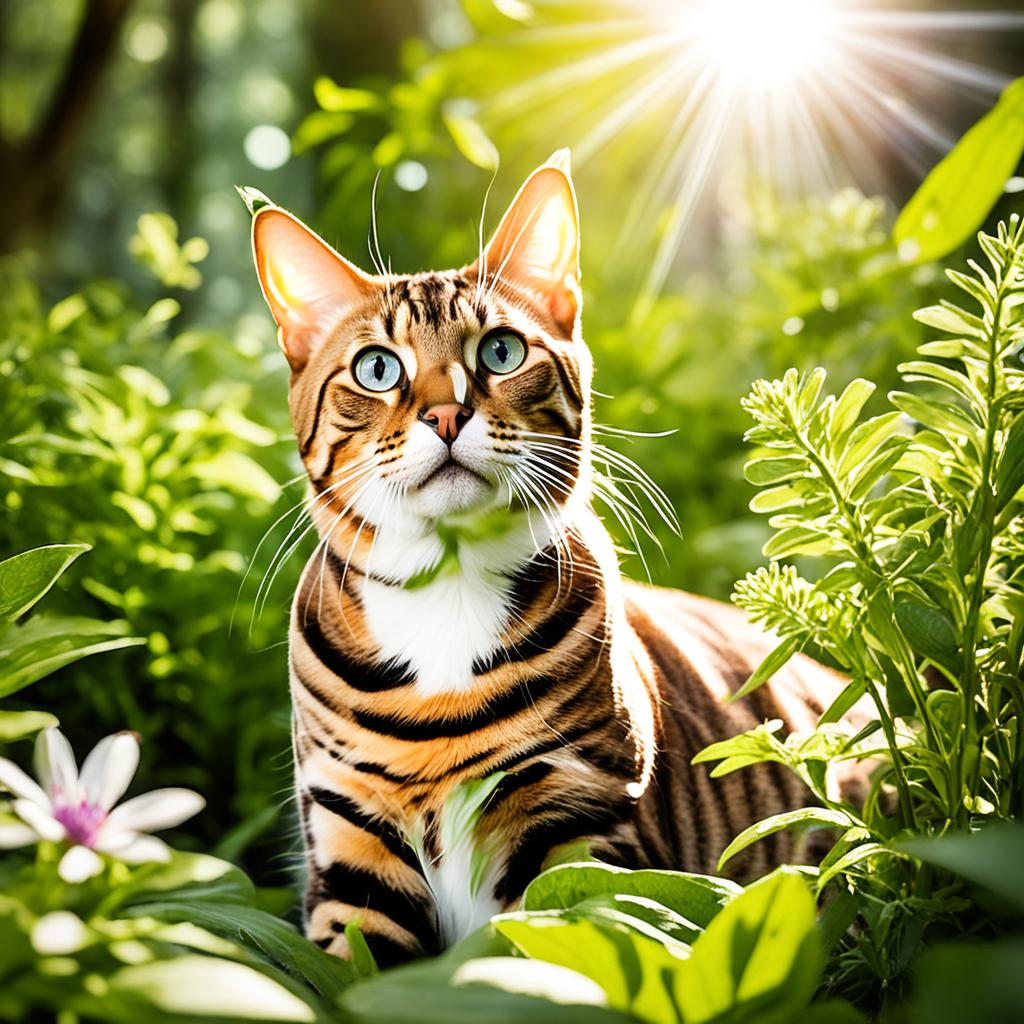
Keeping your Bengal Cat healthy is key for all pet owners. Figuring out why they sneeze is important. It can catch any health issues early.
Environmental Factors
Your Bengal Cat might sneeze because of things in their environment. This includes dust, mold, and strong smells. Watch what’s around your cat and try to make it cleaner and less smelly.
Allergens
Things like pollen, pet dander, and cigarette smoke can make your cat sneeze. It’s smart to keep your home clean and free of these things. This helps keep your Bengal Cat healthy.
Upper Respiratory Infections
If your Bengal Cat has an upper respiratory infection, they may sneeze a lot. This can happen if they catch a virus. Getting the right treatment is important. It might include small changes at home or medicine from the vet.
Identifying Symptoms of Cat Colds
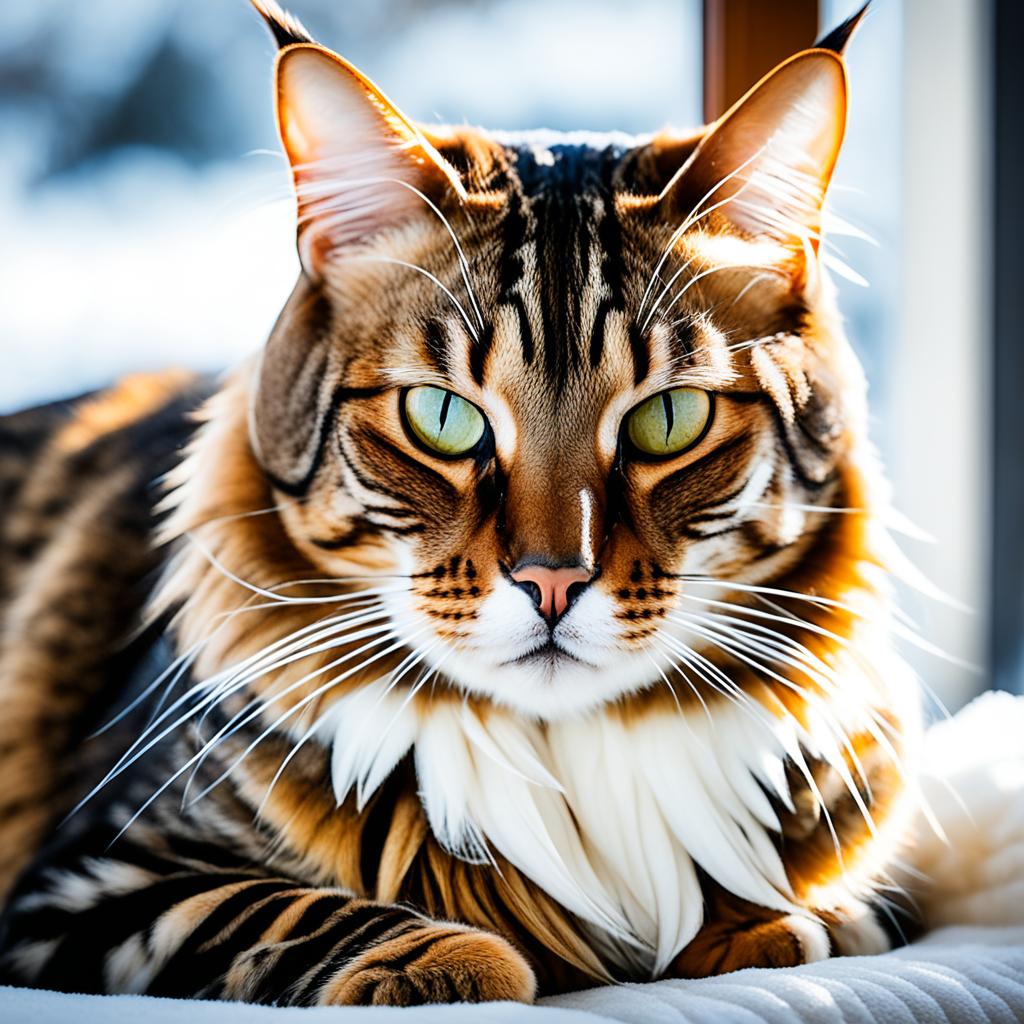
To spot cat cold symptoms, you must be keen. Cats can’t tell you they feel sick. So, keep an eye out for certain signs.
Sneezing and Nasal Discharge
Is your cat sneezing a lot and has a runny nose? Pay attention to the color. Clear stuff means it’s not severe yet. But, yellow or green means it’s serious.
Runny Eyes and Coughing
Watch out for runny eyes and a cough. Your cat might rub its eyes or have watery eyes. Don’t worry if you see them coughing; it means they need help.
If these issues keep up, your cat might face bigger problems. This could be a sign of a weak immune system or nose troubles. It’s very important to watch for these signs.
| Symptom | Description | Severity |
|---|---|---|
| Sneezing | Persistent and frequent bouts | Moderate to Severe |
| Nasal Discharge | Clear to colored mucus | Mild to Severe |
| Runny Eyes | Watery eyes often mistaken for crying | Mild to Moderate |
| Coughing | Frequent attempts to clear throat | Moderate to Severe |
When to Worry About Your Bengal Cat Sneezing
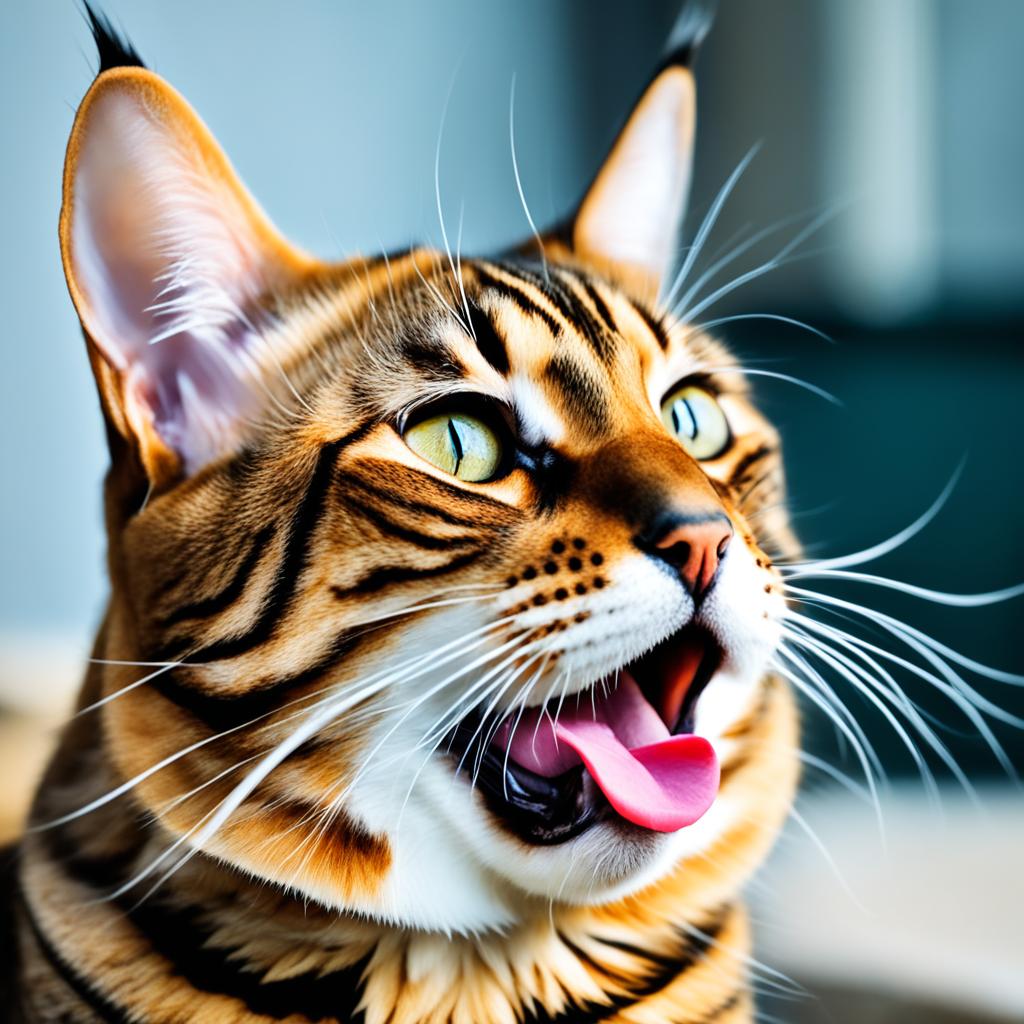
Seeing your Bengal cat sneeze often can make you worry. This is especially true if it goes from a one-off to happening a lot. It’s key to spot if this sneezing is a sign of something more. Watch out for other symptoms like runny nose or eyes, coughing, or a change in behavior. If these appear, it may not just be simple sneezes.
Think about when the sneezing happens. Is it only in certain places or times? This kind of sneezing could point to things like allergens in the air or environmental factors. Check areas where the sneezing is worse for things like dust, mold, or strong scents.
Here’s what to keep in mind for Bengal cat sneezing:
- How often they sneeze
- Any other signs like a runny nose or eyes
- Coughing and how bad it is
- Behavior changes such as being tired a lot or not eating much
- Places or things that seem to start the sneezing
If these points match what you’ve seen, talking to a vet could be a good idea. Getting the right help early is important for your cat’s health.
What to Do If Your Bengal Cat Is Sneezing?
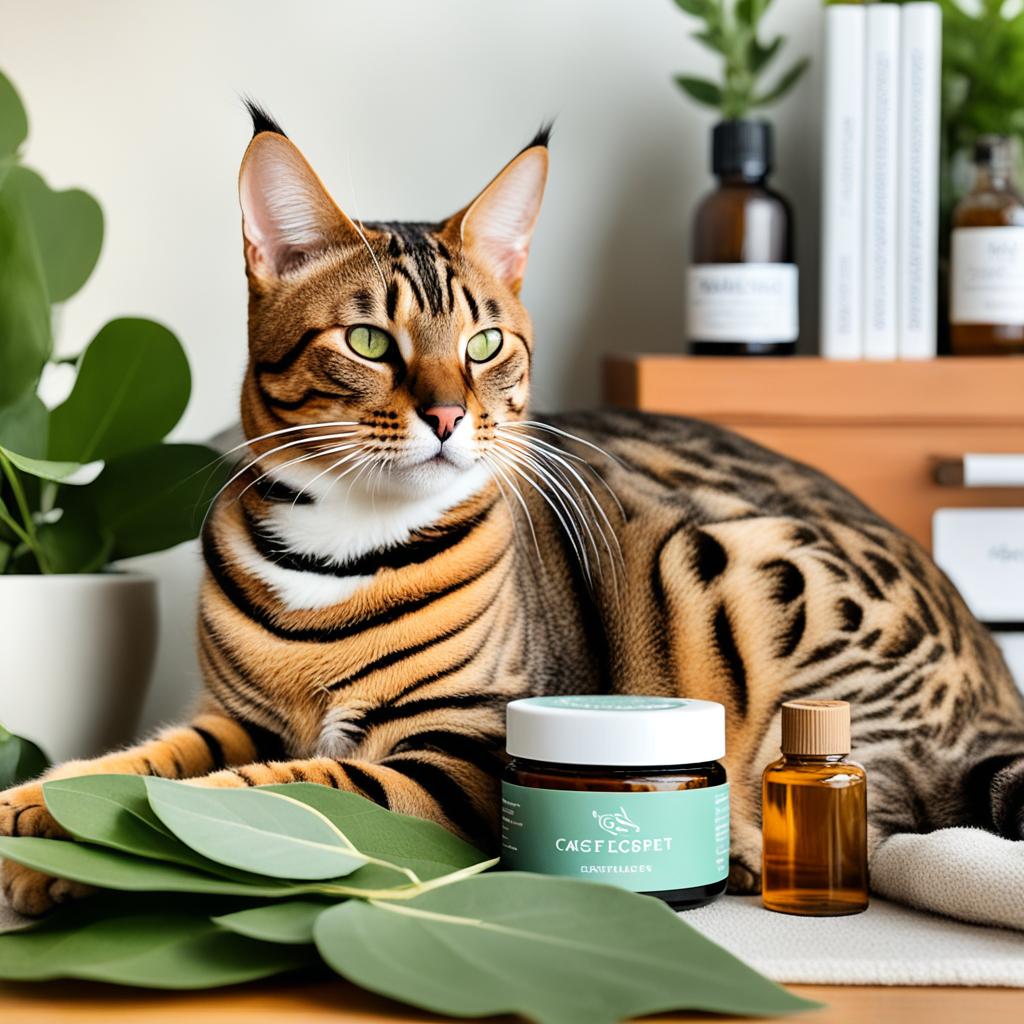
If your Bengal cat is sneezing, act fast to help them feel better. You can use home treatments, see a vet, and take steps to prevent sneezing.
Home Remedies
There are things you can do at home to help your cat stop sneezing. Using a humidifier can add moisture to the air. This helps your cat breathe better and sneeze less.
Also, keep their space clean. Dust and vacuum often to reduce allergens like dust and pollen. This easy step can help your Bengal cat sneeze less.
Medical Treatments
If home remedies don’t work, your vet can offer medical help. Sneezing could be a sign of a bacterial infection, which needs antibiotics. For ongoing problems, your vet might recommend antiviral drugs or immune boosters.
Working with your vet is key. They’ll help find what works best for your Bengal cat.
Preventative Measures
Preventing sneezing is key to your cat’s health. Making sure they get their shots helps prevent illnesses. A good diet and regular vet check-ups also keep your cat’s immune system strong.
These steps create a full plan to stop your Bengal cat from sneezing. They lower the chances of future sneezing too.
Allergies and Your Bengal Cat
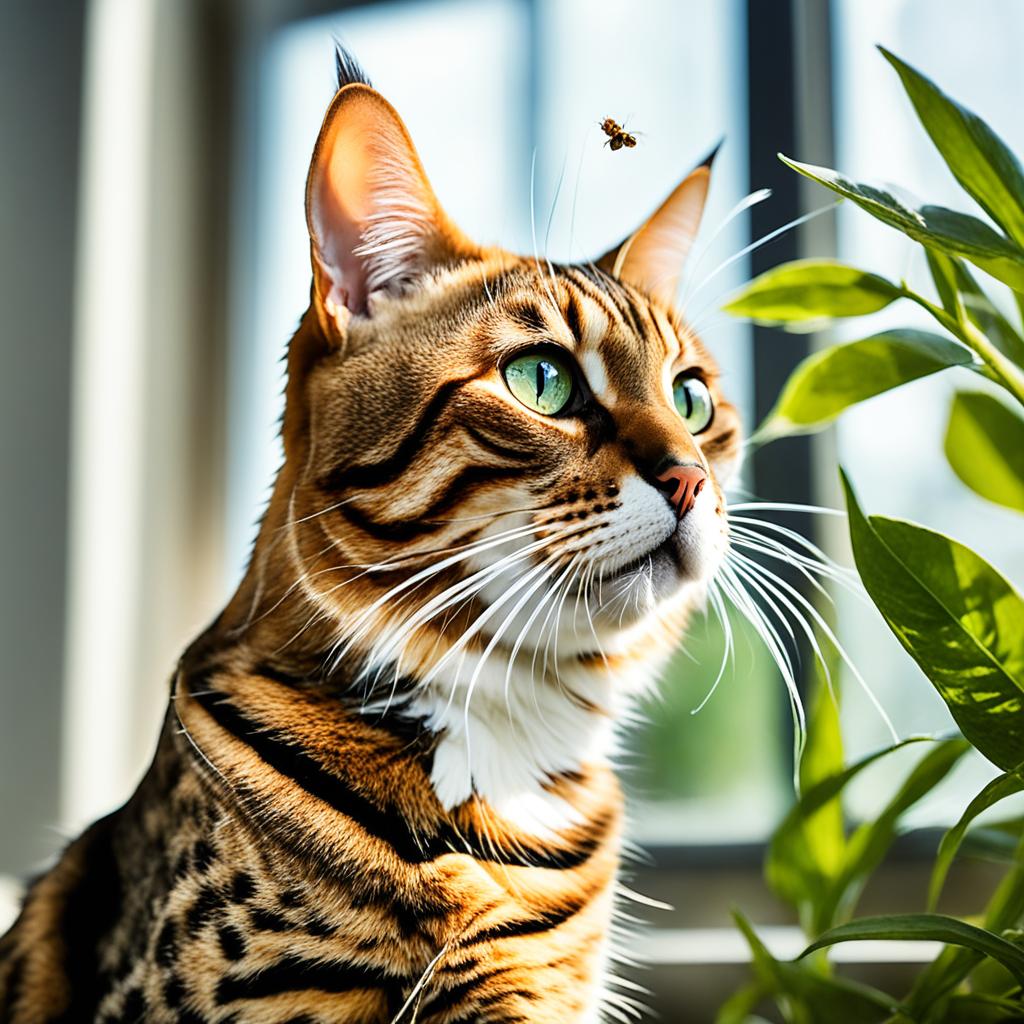
Understanding Bengal Cats’ allergies involves knowing the common triggers and reducing exposure to them. This knowledge can make your cat’s life better. It’s all about finding and dealing with sources of irritation in your home.
Common Allergens
Bengal Cats are often allergic to things like dust mites, molds, and certain proteins from their saliva and skin, including Fel d 1. These can affect both the cat and anyone allergic to cats. Being aware of these allergens helps you lower their presence.
Reducing Allergen Exposure
Keeping things clean helps cut down on allergens. For example, you should vacuum, wash your cat’s bedding, and possibly use air purifiers. These steps help get rid of the substances that cause allergies. Neutering male cats can also reduce the amount of allergens they produce.
| Method | Description |
|---|---|
| Regular Cleaning | Frequent vacuuming and washing of bedding to remove dust and dander. |
| Air Purifiers | Using purifiers to eliminate airborne allergens and improve air quality. |
| Neutering | Neutering male cats can reduce allergen production and potent allergen exposure in cats. |
Choosing a lighter-colored Bengal might be better if you’re worried about allergies. This can make your home a more comfortable place for you and your cat. With the right information, you can help both parties live together more happily.
Types of Infections That Cause Sneezing in Bengal Cats
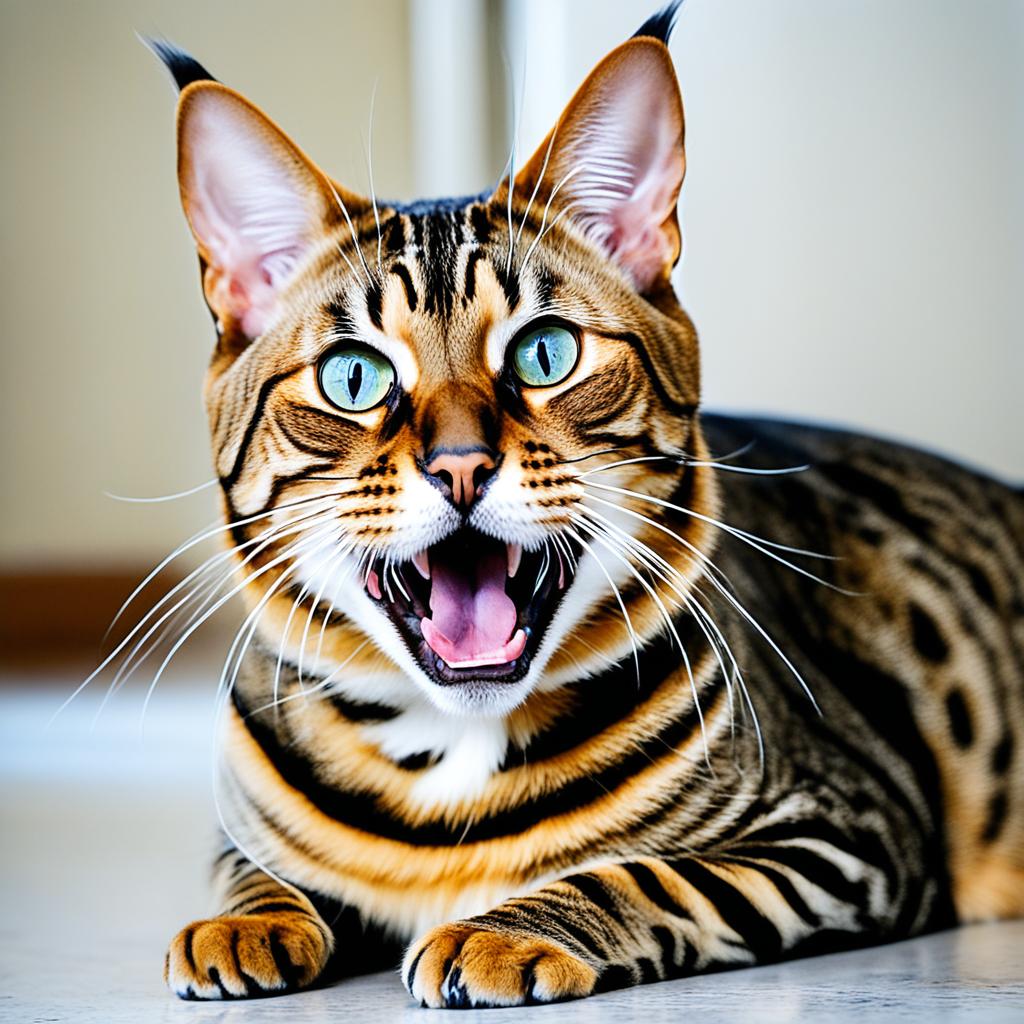
Sneezing in Bengal cats is a clear sign of trouble. Infections are often the reason. These can be viral, bacterial, or fungal. Knowing what’s causing the issue is key to giving the best care.
Viral Infections
Viruses are a common reason for breathing problems in Bengal cats. Feline Herpesvirus and Calicivirus are usual suspects. They act much like colds in people, causing lots of sneezes.
Bacterial Infections
Sometimes, viruses are followed by bacterial troubles. Or, bacteria might start the issue. Either way, these infections can cause a lot of inflammation and sneezing. They usually need antibiotics for treatment.
Fungal Infections
Fungal infections are less common but can still affect Bengal cats. Cryptococcus is one fungus that causes a lot of sneezing. It needs a vet to diagnose and treat. Fungal illnesses demand specialized antifungal treatments.
Preventing Upper Respiratory Infections
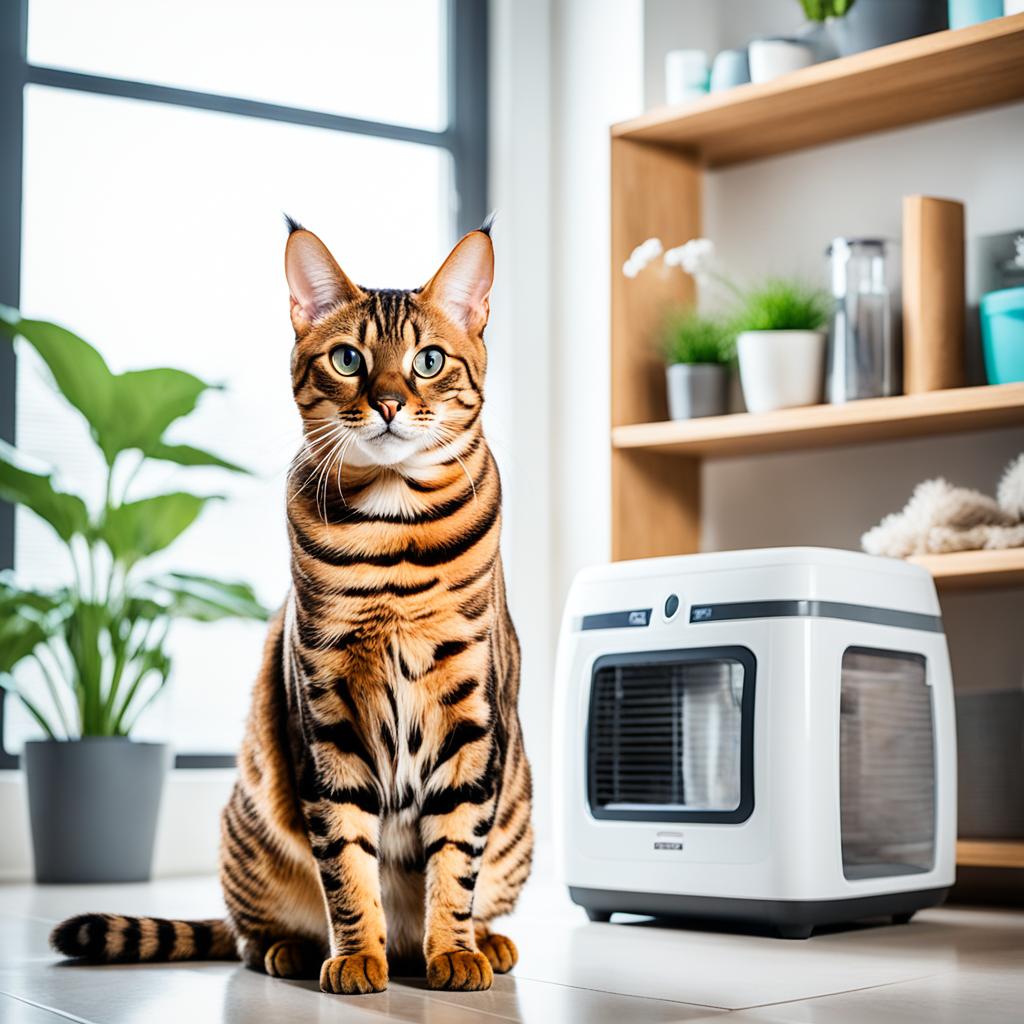
Making sure your Bengal cat is healthy goes beyond play and snuggles. Stopping upper respiratory infections is key to their health. Here are ways to take proactive care.
Vaccinations
Getting Bengal Cat vaccines is highly important. Vaccines boost your cat’s defense against diseases. Talk to your vet to confirm your cat’s shots are on track for the needed preventions.
General Health and Hygiene
Regular vet visits are important for preventing cat infections. Keep your cat’s place clean, away from dust and mold. A good diet and enough water help their immune system.
Keeping their space tidy also reduces their risk of getting sick.
| Prevention Method | Benefit |
|---|---|
| Regular Vaccinations | Boosts immunity against specific pathogens |
| Healthy Diet | Supports robust immune function |
| Clean Living Space | Reduces exposure to irritants |
| Regular Vet Check-ups | Early detection of potential issues |
Following these steps significantly lowers your Bengal cat’s infection risk. This means a happier, healthier life for them.
Home Remedies for Sneezing Cats
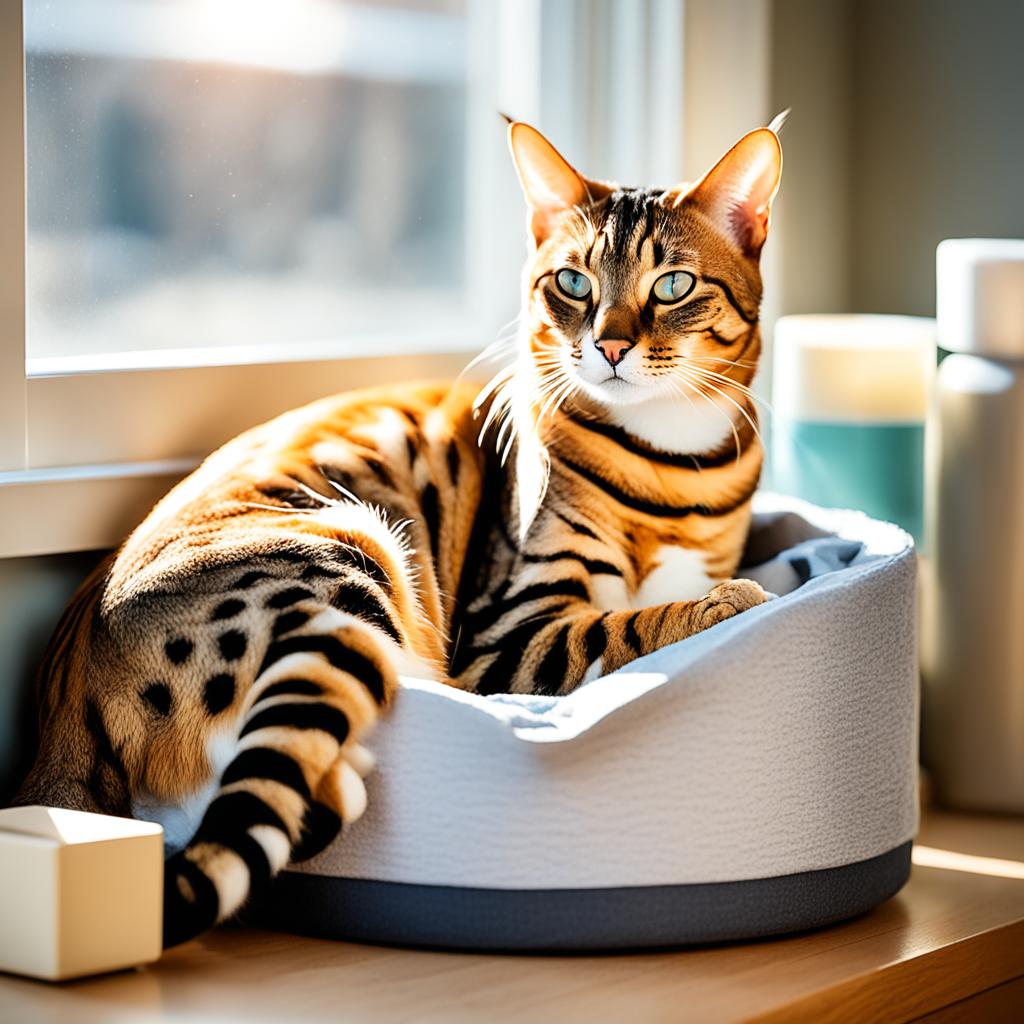
Dealing with a sneezing Bengal cat means using some home remedies. Making sure your cat is comfortable and healthy is the main goal.
Using Humidifiers
A humidifier at home can be really helpful for sneezing cats. They add moisture to the air. This helps clear your cat’s nose and makes breathing easier. Dry air can make nose problems worse, so using a humidifier is a smart move for cat sneezing remedies.
Maintaining a Clean Environment
Keeping your home clean is key for a sneezing cat. It lowers dust and pollen, which trigger sneezing. Less scented products, like air fresheners, also help by reducing allergens.
- Regularly vacuum and dust your home.
- Change air filters frequently.
- Avoid using strong-smelling cleaning products.
- Keep windows closed during high-pollen seasons.
| Action | Benefit | Notes |
|---|---|---|
| Using Humidifiers | Improves air quality | Helps to ease nasal congestion |
| Vacuuming Regularly | Reduces dust and allergen levels | Avoids accumulation of irritants |
| Avoiding Scented Products | Minimizes nasal irritation | Use unscented cleaners |
When to Visit the Vet
If your Bengal_cat keeps sneezing, it’s time to think about veterinary care for sneezing cat. Long-term sneezing may signal a bigger problem needing a vet’s help. Watch for things like discharge from the nose or eyes, a cough, a change in behavior including being tired a lot, or losing weight. These signs mean you should schedule a visit.
Vets can give your Bengal cat a full check and find out what’s wrong. They might use blood tests, X-rays, or more to spot the issue. Knowing exactly what’s causing the sneezes is the first step to the right treatment.
Fast action is key to helping your Bengal cat recover. It could be allergies, infections, or something else. Getting care early can really help your cat feel better. Look out for these signs that it’s time to see the vet:
- Persisting sneezing
- Nasal or eye discharge
- Frequent coughing
- Behavioral changes such as lethargy
- Noticeable weight loss
Keeping an eye on your cat and not delaying the vet visit are very important. A fast check and starting the right Bengal Cat sneezing treatment will help them get back to health.
Nutritional Support for a Healthy Immune System

Your Bengal cat’s immune health is key. A balanced diet and the right supplements make your cat’s defense strong. This helps fight off sickness and stay healthy.
Balanced Diet
Feeding your cat well is vital for immune health. Focus on fresh proteins, enough fiber, and key vitamins and minerals. Try to give your cat a variety of foods. This includes:
- High-protein meats like chicken, turkey, or fish
- Complex carbohydrates from vegetables and grains
- Essential fatty acids from sources like salmon oil or flaxseed
Supplements for Cats
Some cats need extra supplements based on their health or diet. Here are some common picks:
- Omega-3 Fatty Acids: Supports skin health and lessens swelling.
- Probiotics: Good for the stomach and improves digestion.
- Vitamin C and E: These help as antioxidants, boosting the immune system.
| Supplement | Benefit | Examples |
|---|---|---|
| Omega-3 Fatty Acids | Reduces inflammation, supports skin and coat health | Fish oil, flaxseed oil |
| Probiotics | Improves gut health, aids digestion | FortiFlora, Bene-Bac |
| Vitamins C and E | Antioxidant support, boosts immune function | Supplement powders and drops |
Talk to your vet often to check your cat’s diet. A good diet and supplements can keep your cat well. This also cuts down on sickness and boosts health overall.
Conclusion
When your Bengal cat starts sneezing, it’s key to watch their health closely. An occasional sneeze isn’t cause for alarm. But if they sneeze a lot or hard, it might mean something serious is going on.
Things like where they live, what they breathe, and infections can make them sneeze more. Knowing these reasons helps you deal with them better. This can make your cat healthier and happier.
If your cat shows signs like a runny nose, watery eyes, or cough, it’s a sign to act fast. Simple things at home, like using a humidifier, might help. But if the sneezing doesn’t stop, check with a vet right away.
Giving your Bengal cat the right care and food is crucial for their health. Staying up to date on vaccinations and feeding them well boosts their immune system. This cuts down on sneezing fits.
Being alert and taking action early keeps your Bengal cat in good shape. With care and watchfulness, you can make sure they live a healthy, sneeze-free life.
FAQ
What are the common causes of Bengal Cat sneezing?
Sneezing in Bengal cats might happen from dust, mold, or strong smells. Also, pollen, smoke, or upper respiratory infections, from viruses like Feline Herpesvirus 1 and Feline Calicivirus, can make them sneeze.
What symptoms should I watch for that indicate my Bengal cat has a cold?
Look out for your cat sneezing a lot, having a runny nose or eyes, and coughing. They might also seem tired, not eat much, and rub their face. These are signs they might have a cold.
When should I worry about my Bengal cat sneezing?
If your cat is sneezing a lot and has runny nose or eyes, also watch for coughing, tiredness, or not eating. They might need to see a vet.
What are some effective home remedies for a sneezing Bengal cat?
You can keep the air moist with a humidifier. Make sure their living space is clean and don’t use strong-smelling products.
What medical treatments are available for persistent sneezing in Bengal cats?
Your vet might give antibiotics for a bacterial infection or special treatments for ongoing issues. Always check with a vet for the right treatment.
How can I prevent my Bengal cat from sneezing due to allergies?
To stop allergic sneezing, find and avoid things your cat is allergic to. Keep their space clean, use air filters, and clean often to cut down on allergens.
What types of infections cause sneezing in Bengal cats?
Bengal cats might sneeze from viruses like Feline Herpesvirus and Calicivirus, or after a viral infection, get a bacterial infection. Fungi, like cryptococcus, can also be a cause.
How can I prevent upper respiratory infections in my Bengal cat?
Prevent infections by getting your cat vaccinated and keeping them healthy and clean. Good food and a clean living place are important.
What are some recommended home remedies for sneezing cats?
A humidifier and a dust-free home can help your cat’s sneezing. Don’t use scented products that may cause sneezing.
When should I take my Bengal cat to the vet for sneezing?
If your cat’s sneezing won’t stop, or they have other signs like coughing or not eating, see the vet. They need a full check-up to know what’s wrong.
How can nutritional support boost my Bengal cat’s immune system?
Good food and maybe some supplements can help your cat’s immune system. A vet can help you pick the best diet for your Bengal.




